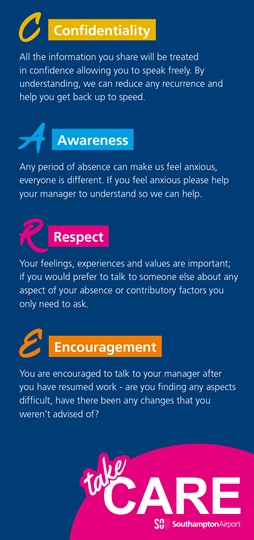CARE is a mental health strategy supporting staff through promoting well-being and providing specific training on mental health and stress management.
 The stigma associated with mental health remains a major obstacle to the effective diagnosis and treatment of mental health conditions.
The stigma associated with mental health remains a major obstacle to the effective diagnosis and treatment of mental health conditions.
It can prevent employees from talking to colleagues or managers about their problems because they fear discrimination; it may even prevent them from acknowledging to themselves that they have a problem.
CARE creates a climate where people feel confident to talk openly about the issues they are experiencing and trust their employer to do the right thing. By tackling the issue of mental health in the workplace from the starting point, we hope that it will address the stigma and stereotypes associated with mental ill health.
The programme supports all employees to become aware of what well-being is, what the benefits are, and how they can achieve it. They will be better equipped to look after themselves and be more sensitive to the needs of others.
The company’s attitude and approach to supporting its employees can have a significant impact on their attendance, behaviour and performance.
Sometimes managers are promoted or recruited based on their technical skills and value to an organisation and consequently manage a team without receiving any specific training in people management, leaving them both ill-equipped and quite possibly uncomfortable in dealing with some of the human factors.
While poor physical health can be understood and effectively managed, poor mental health is a more challenging conversation and warrants specific training to ensure colleagues receive effective and compassionate support when it is required
CARE provides mental health training sessions to incorporate an overview of mental health conditions and common issues and how to enable managers to have a potentially emotive or difficult conversation with their employees and provide suitable support.
CARE Training
This high impact training course delivers the foundation of the CARE principles training managers to better equip them with the knowledge and skills to recognise mental health distress and have the confidence to support/signpost those affected by it.
The objectives are to:
- Increase knowledge, skills, and confidence around the subject of mental health
- Provide information and guidance to managers to support colleagues who may be experiencing mental health issues.
The training content will include:
- Defining mental health and the issues related to it
- Identify stigma and discrimination surrounding mental health issues
- Developing a culture in which mental health can flourish
- Recognising distress and how to respond
- Appropriate language and how to start a conversation
- Relate to people's experiences and support people in distress (including signposting to relevant services)
- Strategies and tools for managing mental health in the workplace (1-2-1s, team meeting, etc)
- Looking after your own mental health
CARE for Everyone
It is well documented that employees tend to foster closer relations with their peer group rather than with their manager. Friendships such as this lead to greater disclosure regarding personal matters, and through targeted training
CARE for Everyone can support all employees by helping them understand how to respond and provide real value. Designed to complement the CARE training,
CARE for Everyone ensures all employees feel involved and connected to CARE and can support each other should the need arise.
The training content will include:
- Common signs & symptoms related to poor mental health
- Recognising distress and how to respond, including the promotion of the Employee Assistance Programme
- Self-care: looking after our own mental health & wellbeing.
- Exploring work-life and home-life factors, current coping mechanisms: effectiveness and other options
- Peer to peer support: encouraging a climate of mutual support.
Complimentary to the training, CARE works with the company’s HR department and any Employee Assistance Programme / Occupational Health, to amend any existing ‘return to work’ process, turning existing policy into a compassionate, constructive conversation which ensures that staff feel supported.
CARE vs Mental Health First Aid (MHFA)
The airport’s research identified that statistically one in four employees are currently or recently suffered from poor mental health. Many employers have considered training a few volunteers to become certified mental health first-aiders.
Initially created for the public sector, MHFA started to become a popular choice within the private sector. Whilst raising awareness of mental health is commendable and should be encouraged, without the robust support structure available within the public sector some of these volunteers have been exposed to issues well beyond their two-day training remit. This resulted in concerns raised by both the Institute of Safety and Health (IOSH) and the Health and Safety Executive (HSE) regarding both the effectiveness and safeguarding of these individuals.
CARE provides the same level of mental health awareness as MHFA.
It ensures that all managers are trained and feel confident to discuss mental health and manage disclosure. It highlights the inter-dependencies between poor physical and mental health, enabling a manager to have a ‘quality’ conversation with any employee returning from an absence. Similarly having all managers trained in understanding the signs and symptoms of poor mental health within their team, it can help an individual to seek help and support before seeking to take leave. Sometimes all we need is for someone “to start the conversation.”
For more information, please contact adrian.cameron@southamptonairport.com